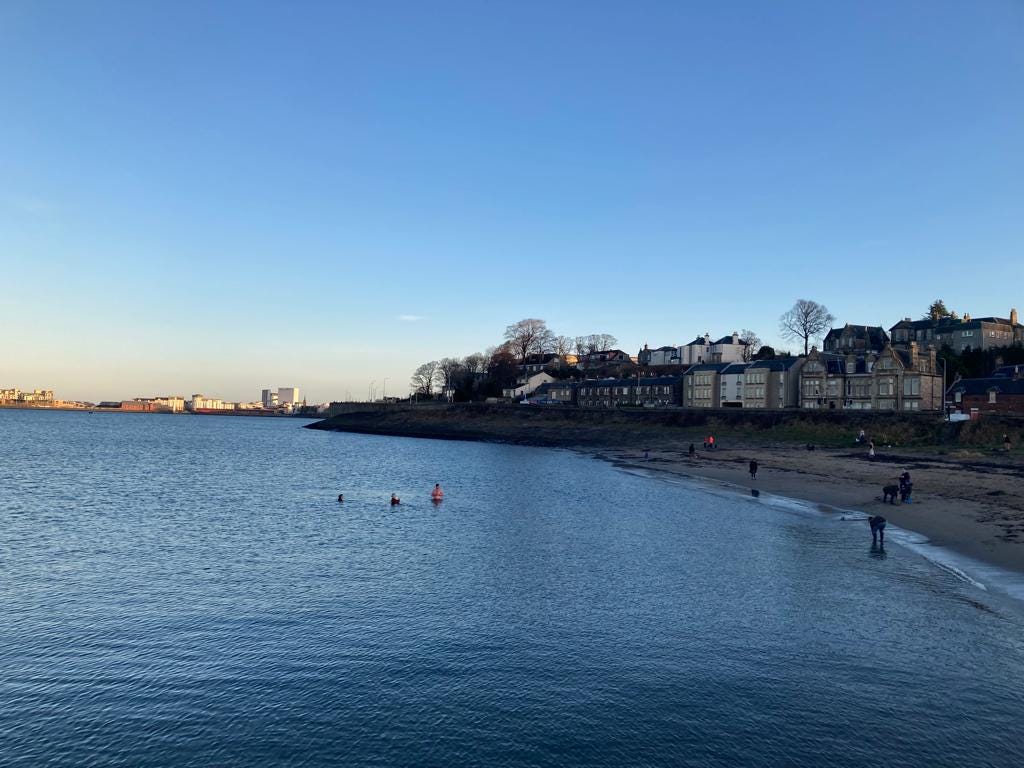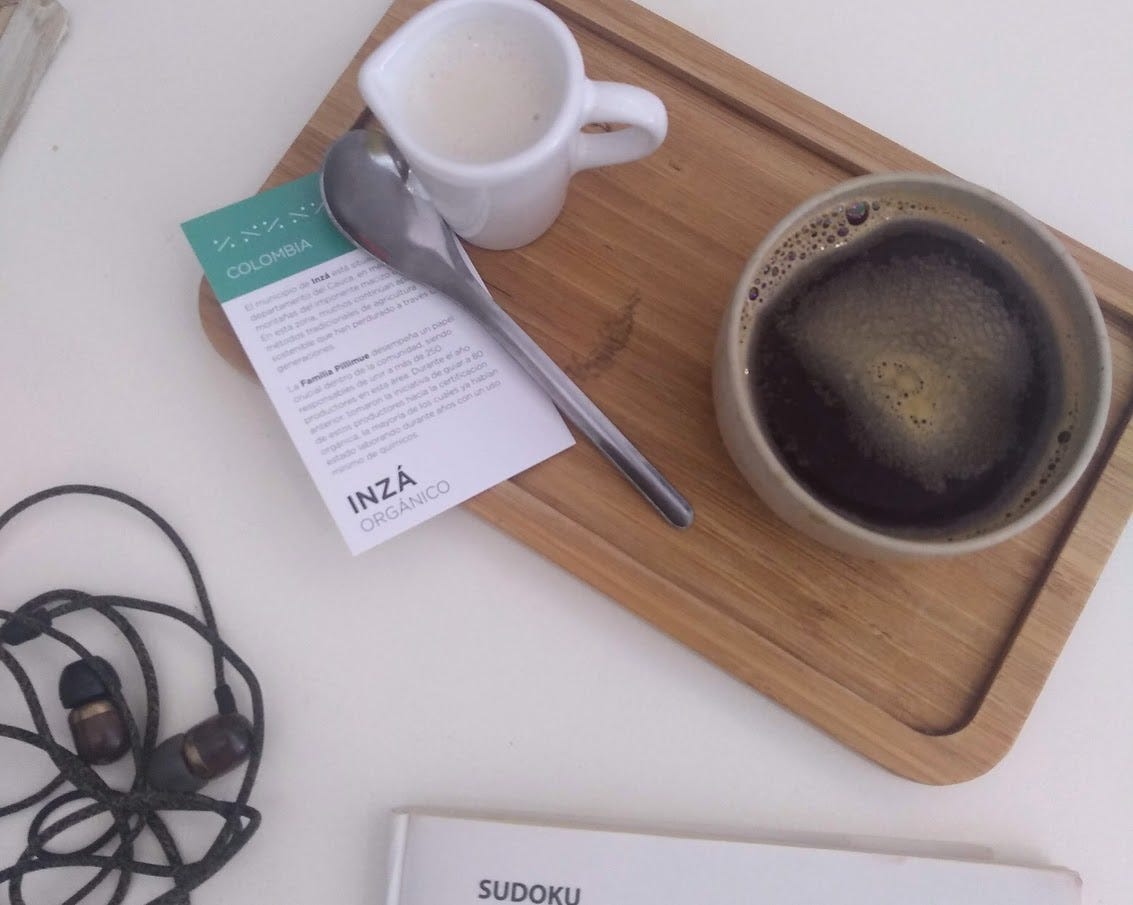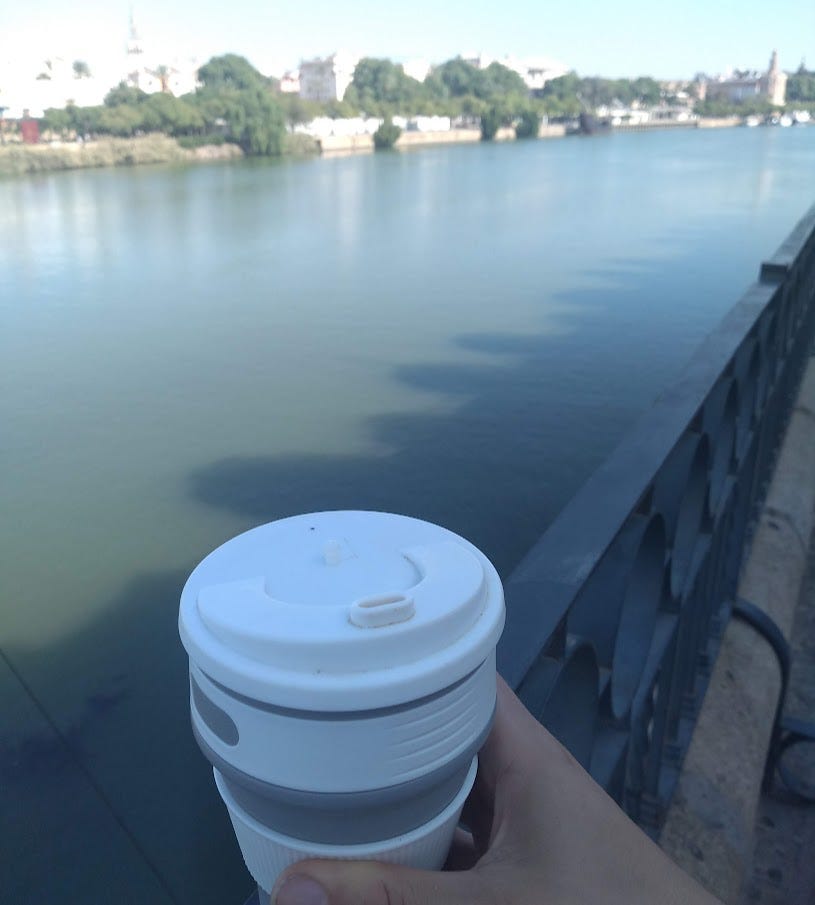No you don't spend too much money on coffee or small things that make you happy
Capitalism thrives on your personal guilt. Time to kick the habit.
Assistant Editor
writes today’s introduction.The last couple of weeks have felt really heavy. I want to acknowledge the grief and darkness I’ve been feeling about the ongoing genocide in Palestine, but the grief doesn’t belong to me.
Being flooded with devastating news, and seeing people I care about suffering, knowing that all I can do is show up to protests and support relief efforts from afar feels insignificant.
In the face of so much overwhelming suffering, I’ve found it really hard to engage with climate organising spaces I’ve been at recently - feeling disconnected from a movement I normally feel deeply connected to.
I think it’s partly because the work feels detached from current events, and so I feel like I’m focusing on the ‘wrong’ crisis even when that doesn’t make sense to say. No disaster is isolated. We’re living in a colonial, capitalist mess of interconnected social and ecological issues, all compounded to leave us feeling powerless, exhausted and anxious.
Last week, I went to the Scottish National Party conference with Green New Deal Rising. Some of the discussions were really exciting. But there was also a massive Heathrow airport sponsorship section in the main area of the conference.
The cognitive dissonance between the Scottish Members of Parliament talking about the climate emergency and their conference being funded by a company from one of the most ecologically damaging industries is scary - sometimes with campaign work, it can feel like you’re banging on locked doors, and it can be hard to hold on to the difference you are making.
But at the conference, I also felt so energised by being surrounded by great people from environmental groups like GNDR and Friends of the Earth. It reminded me how important and radical it is to invest in community.
As well as the conference, last week I (finally) made it to Granton community garden. I was weeding in the pouring rain for two hours, and then had lunch in the community centre. I tried mustard leaves for the first time, and chatted to a lovely lady called Di about travelling and finding community in the garden.
I’ve also become a bit addicted to swimming in the sea. It’s funny because I grew up in London and remember thinking that people who swam in the sea in winter were insane. But somehow, while living in Edinburgh, it’s wormed its way into my weekly routine, and now I have friends (most importantly old ladies) who I laugh with every time we run into the freezing cold Atlantic.
Making green (and blue) spaces like this more accessible is increasingly what grounds my environmental action, and recently I’ve felt really inspired by work from activists like @outsidewithlira and Ellen Miles.
People don’t protect what they don’t love. We all need to have relationships with our environment, our communities and the physical space we inhabit to care about the climate crisis, but also to weather the sometimes overwhelming work that comes with climate action and social justice.
We’re looking for guest writers! If you’re interested in covering an introduction or longer piece for The Green Fix, fill out this expression of interest (and if you’ve already applied - we have seen all responses and will reach out soon!).
What’s Going On?
Shell shares hit record high as Israel-Hamas war drives up oil price.
Related: When conflict meets climate change, in Gaza and beyond.Africa and India push rich nations to phase out fossil fuels faster.
Related: Inside the campaign that put an oil boss in charge of a climate summit.How big agribusiness used hikes and free rent to influence European conservatives.
Related: 70 groups call on UN to tackle global food system emissions.Here’s what’s driving the record autumn heat (it’s not just carbon emissions).
Related: Demand for fossil fuels will peak before 2030.Ex-officials at UN farming body say work on methane emissions was censored.
Useful: The urgent need for methane literacy.
If you’d like to support The Green Fix, please consider tipping us a virtual coffee.
Focus On… Sustainable Coffee
Cass on searching for good coffee as an anticapitalist practise (and what that even means).
I feel guilty when I spend money on coffee. Despite this, I’ve been buying a lot of them this month. Almost obsessively. After being accepted on an intense entrepreneurship programme to find funding for The Green Fix, discussing business strategies in the south of Spain became my temporary home.
It was intense. So I did what I always do when faced with stress - I left entirely and went to get a coffee. Most of the cafes weren’t even laptop-friendly (one-sentence horror story for remote workers). I went anyway. It became my project/distraction/coping mechanism to do the tour of specialty coffee shops.
The Green Fix is late this week because I was on a bus trailing from Seville to Barcelona. So instead of a Q&A, here’s a collection of reflections on what sustainable coffee means and how to find it.
How much information is there about who produced the coffee?
First weekend. I was lost in the winding streets and found myself in Parcería Cafe, hidden behind an indoor market.
37 degrees Celsius outside. I couldn’t focus on my book and my sudoku was too hard for me. I read the bags of coffee for sale instead. My own order came with a little card explaining the origins of the coffee beans.
Brazil. Ethiopia. Kenya. Washed. Natural. You don’t need to know what these mean if it all tastes the same to you, but the information should be there anyway.
If I take a picture and sell it, I expect to be credited for the work. Why should coffee be any different? If it’s not obvious where the coffee comes from, perhaps it’s not a nice truth to know.
The cafe should be able to tell you who made the coffee - down to the farm. You should know who made your drink. Nestle did not make your coffee. Someone with a whole life and story did. If we play at wilful ignorance, how can we then turn and criticise the corporations that allow us to be ignorant?
Maybe step one is to care.
Read: What information to look for on a bag of coffee.
Go to small local coffee shops rather than chains
“You must drop by before you leave Seville!” I saw this message from a haze of stress behind my laptop. To-do list: infinite. Emails stacking up.
Don’t need to tell me twice. I packed up all my stuff and walked. It’s not a short walk either but I’m done with rushing. Through the hordes of tourists in Plaza de España, along the vast river and over the bridge into Triana.
Selva coffee is not really a laptop space but I wanted to be in that third space. The first time I visited, the owners, a British-Venezuelan couple, told me they opened three weeks ago. It was their dream to do this after years of travelling. One coffee pitstop turned into a two-hour chat. For me, an escape.
Small business owners will tell you everything about how they operate, if you ask. It matters that you spent your money on them. Starbucks will never notice if you boycott them.
I can go to Starbucks anywhere if I feel like paying a tax-dodging mega-corporation. But I can only go to Selva here, in this month, in this place. Small businesses are the often-fragile heart of a place.
Read more: 6 reasons to support your local coffee shop.
Opt for plant-based
I have drunk a lot of black coffees out of resentment at the extra charge for plant-based milks.
Plant-based milks are far more sustainable ecologically (this is the part where someone triumphantly announces to me that soy production also has an environmental impact without reading that most of this soy is used for livestock feed… for cows). But in order to make plant-based options the financially sustainable options for small businesses, we need to increase demand.
When I power-walked to Veganitessen between workshops, it was partially because there were only vegan options there. And businesses that care about their impact on animals and the planet tend to care about the quality too.
Take a reusable cup or drink in
Your recyclable coffee cup was probably not recycled. And your 'compostable vegware' cup can only be industrially composted. And I think I’ll go mad if another person asks.
“The problem is,” they tend to say. “People where I live in [the UK/Croatia/Greece/India/the US/Mars] just don’t care and they put things in the wrong bins.”
That’s a problem. It’s not the problem. An average of 40% of waste in Europe gets recycled. We do not have the infrastructure, and the energy required to create plants that could recycle the mountains of trash almost renders the endeavour redundant.
We could talk about how awful that is. Or take a reusable cup and write to your local politician to demand a transition to an economy of circularity. These days, everything comes back around.
Take your time
Most of the time in Seville I was exhausted. Town suddenly seemed an eternity away. Most of the places didn’t have internet anyway. I was essentially wasting time and money on coffee without even justifying it by working while I was there.
(And I wonder why I’m tired, with thoughts like these…).
I’ll feel guilty if I go and spend more money, I thought. And I’ll feel guilty if I stay here and do ‘nothing’. There’s no winning in a brain where all pleasures must be transactional and earned. May as well just rip off the band-aid.
I went all the way to MUY Coffee, which everyone told me was the best in town. Small tucked-away shop with a queue of people out the door. Safe harbour.
“Are you taking it to go or to have here?”
I hesitated. My instinct was to take it away. I always feel like I need to be on the way somewhere. I even try to sightsee as fast as possible. Life at double speed.
But I impulsively said “Here.” Then realised the shop had 2 seats and I brought nothing with me. Awkward.
Reader, turns out an hour chatting to the barista and fellow customers about coffee and Seville was what I needed to reverse the exhaustion.

Many environmental and social issues in coffee production come from an economy of overproduction and overconsumption. We expect coffee cheaply, everywhere, and more of it each year. So corporations bring it.
Corporations pay farmers less and charge us more, stick a green label on their package to convince the rushed shopper it’s not all bad, and we drink it - and all the pesticides used in cheap coffee production - in 5 minutes on our way to work. Metro boulot dodo.
Because just like the planet, our internal resources are exhausted. Who has the time to scope out local coffee bars and pay double for ethical coffee? Who has time these days? Who has money?
(Re)claiming your time to make decisions that match your values is the easiest way to dismantle this vicious naive and time-limited system. I can’t afford a house. I can’t afford a masters degree. We can’t afford most things no matter how carefully we budget and cut down. Prices are rising, wages are lowering, and this economic system tells us it’s our fault for buying too many avocados and chai lattes.
Who wants to live like this? Agonised with guilt over small expenses while the 1% own half of all wealth. I go back and forth with this on the daily but ultimately I think we spend too much time punishing ourselves for seeking a moment of happiness and stillness. A sustainable coffee. Talking to a neighbour. An ice cream. A train trip to the sea. These things, I can afford.
While most traditional economic goals fall further away from reach, we seek alternatives based on care and connection. Anticapitalism with a cup of coffee is a far more sustainable and sweeter way to live.
I’ll do a summary of the sustainable coffee shops in Seville (and later in Barcelona) on my Instagram @coffee_and_casstaways.
By the way…
London Doughnut Economy Coalition (LDEC) is organising a Global Donut Day in London on 13 November 2023.
At The Good Company in Camden, the London Doughnut Economy Coalition and Impact on Urban Health will host Global Donut Day, a unifying day of local action and global connection, linking over 30 places, from Melbourne to Mexico City and Beijing to Brazil.
Through workshops, debates, discussions and celebrations, Global Donut Day London will consider what our city needs to do now to support an economy to provide for the needs of all Londoners, whilst respecting the environmental and ecological limits of our planet.
Sign up today here.
The Green Fix offers low-cost sponsored slots on the newsletter. Book your slot by emailing wearethegreenfix@gmail.com.
So Now What Do I Do?
LEARN
Read: Climate change has toppled some civilizations but not others. Why?
Take a free online course on ‘Freedom of Expression and Information in the Time of Globalization’.
TRY SOMETHING NEW
Extinction Rebellion are holding a photo contest around the theme of ‘Water.’ Submit yours by 1st November.
Join the UN’s 2-day ‘Nature for Life’ hub to discuss how to safeguard biodiversity. 7-9 November.
Calling artists! Ways of Repair are seeking 3 artists/curators for research projects around the theme of loss and damage. Apply by 12 November.
CHANGE THE SYSTEM
The Shaping Futures Academy is looking for 25-40 year olds interested in working on sustainable European-African relations. Apply by 15 Nov.
Apply for this cool mentorship programme designed to promote values-based leadership at the Global Thinkers Forum. Deadline 30 November.
BIPOC campaign leaders can apply to this fellowship by Social Movement Technologies by 15 Dec. (Scholarships available if you apply early).
Stay in the loop
You can follow The Green Fix on Twitter @TheGreenFix, Instagram @thegreenfix_ and LinkedIn. You can also connect with Cass Hebron (Editor) on Instagram @coffee_and_casstaways, Twitter @casstaways and LinkedIn Cass J Hebron.














